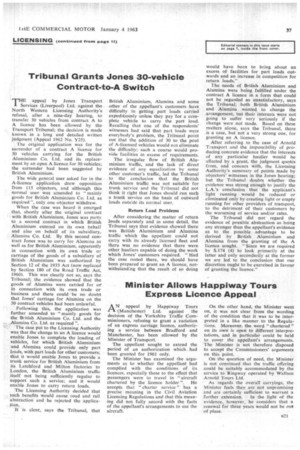Tribunal Grants Jones 30-vehicle Contract-to-A Switch
Page 39

If you've noticed an error in this article please click here to report it so we can fix it.
THEappeal by Jones Transport Services (Liverpool) Ltd. against the North Western Licensing Authority's refusal, after a nine-day hearing, to transfer 30 vehicles from contract A to A licence has been allowed by the Transport Tribunal; the decision is made known in a long and detailed written judgment (Appeal 1962 No. Y25).
The original application was for the surrender of a contract A licence for 30 vehicles carrying for the British Aluminium Co. Ltd. and its replacement by an open A licence for 30 vehicles; the surrender had been suggested by British Aluminium.
The wide general user asked for in the A-licence application drew opposition from 115 objectors, and although this normal user was amended to "mainly goods for British Aluminium Co. Ltd. as required ", only one objector withdrew.
When the case was heard it emerged that, shortly after the original contract with British Aluminium, Jones was party to a second contract in which British Aluminium entered on its own behalf and also on behalf of its subsidiary, Alumina Co. Ltd. By this second contract Jones was to carry for Alumina as well as for British Aluminium, apparently in connection with its own trade or carriage of the goods of a subsidiary of British Aluminium was authorized by Section 12 of the 1933 Act (now replaced by Section 180 of the Road Traffic Act, 1960). This was clearly not so, says the Tribunal; the evidence showed that the goods of Alumina were carried for or' in connection with its own trade or business and there could be no doubt that Jones' carriage for Alumina on the 30 contract vehicles had been unlawful.
Following this, the application was further amended to "mainly goods for the •British Aluminium Co. Ltd. and the Alumina Co. Ltd. as required ".
The case put to the Licensing Authority was that the change to an A licence would enable Jones to complete the loading of vehicles, for which British Aluminium and Alumina could provide only part loads, with part loads for other customers; • that it would enable Jones to provide a trunk service for British Aluminium from its Latchford and Milton factories to London, the British Aluminium traffic itself not being sufficiently regular to support such a service; and it would enable Jones to carry return loads.
The Licensing Authority decided that such benefits would cause road and rail abstraction and he rejected the application.
It is clear, says the Tribunal, that British Aluminium, Alumina and some other of the appellant's customers have difficulty in getting part loads carried expeditiously unless they pay for a cdmplete vehicle to carry the part load. Recalling that one of the respondents' witnesses had said that part loads were everybody's problem, the Tribunal point out that the addition of 30 to the pool of A-licensed vehicles would not eliminate the difficulty; such a course would provide facilities in excess of requirements.
The irregular flow of British Aluminium traffic, and the lack of direct evidence of any equalization by some other customer's traffic, led the Tribunal to the conclusion that the British Aluminium traffic was not suitable for trunk service and the Tribunal did not think it right that Jones should run such a trunk service on the basis of outward loads outside its normal user.
Return Load Problems
After considering the matter of return loads separately and in some detail, the Tribunal says that evidence showed there was British Aluminium and Alumina traffic which the appellant could not carry with its already licensed fleet and there was no evidence that there were other hauliers capable of doing the work which Jones' customers required. "Had the case rested there, we should have been prepared to grant an A licence, notwithstancEng that the result of so doing
would have been to bring about an excess of facilities for part loads outwards and an increase in competition for return loads."
The needs of British Aluminium and Alumina were being fulfilled under the contract A licence in a form that could not he regarded as unsatisfactory, says the Tribunal; both British Aluminium and Alumina wanted to change the arrangement, but their interests were not going to suffer very seriously if the change were not made. Based on these matters alone, says the Tribunal, there is a case, but not a very strong one, for granting an A licence.
After referring to the case of Arnold Transport and the impossibility of producing concrete evidence that the interests of any particular haulier would be affected by a grant, the judgment quotes from, and concurs with, the Licensing Authority's summary of points made by objectors' witnesses in the Jones hearing; but the Tribunal doubts whether the evidence was strong enough to justify the L.A.'s conclusion that the applicant's light running would be reduced or eliminated only by creating light or empty running for other providers of transport, to the detriment of their customers by the worsening of service and/or rates.
The Tribunal did not regard the evidence of possible abstraction as being any stronger than the appellant's evidence as to the possible advantage to be derived by British Aluminium and Alumina from the granting of the A licence sought. "Since we are required by S.174 (4) to look primarily at the latter and only secondarily at the former we are led to the conclusion that our discretion ought to be exercised in favour of granting the licence."








































































































